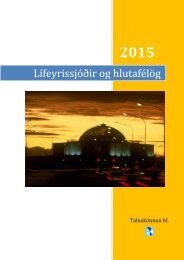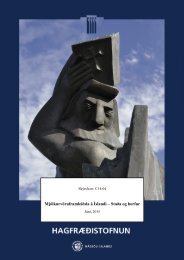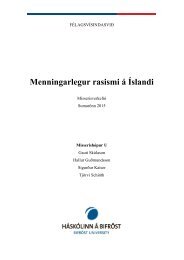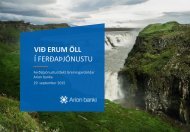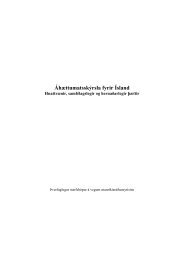You also want an ePaper? Increase the reach of your titles
YUMPU automatically turns print PDFs into web optimized ePapers that Google loves.
WORLD REPORT 2016<br />
HUMAN RIGHTS WATCH<br />
Singapore<br />
Singapore uses overly broad legal provisions on public order, morality, security,<br />
and racial and religious harmony to limit fundamental civil and political rights.<br />
On March 23, Lee Kuan Yew, the founding prime minister of Singapore, died at<br />
age 91 after a short illness. In September, the ruling People’s Action Party (PAP)<br />
won 83 out of 89 seats in general elections. The PAP has ruled Singapore since<br />
1959.<br />
Freedom of Peaceful Assembly, Association, and Expression<br />
The government maintains restrictions on the right to freedom of peaceful assembly<br />
through provisions of the Public Order Act, which require a police permit<br />
for any “cause-related” assembly in a public place or to which members of the<br />
general public are invited. Grounds for denial are broad.<br />
Associations of more than 10 people are required to register with the government,<br />
and the Registrar of Societies has broad authority to deny registration if it<br />
is determined that the group could be “prejudicial to public peace, welfare or<br />
good order.”<br />
Protests and rallies conducted at the Speakers’ Corner in Hong Lim Park do not<br />
need a police permit provided that the topics discussed do not touch on religious<br />
or racial issues, and the organizer and speakers are Singaporean citizens.<br />
Foreigners who are not permanent residents may not participate unless they<br />
have a police permit.<br />
During the year, the government continued its prosecution of activists relating to<br />
a Hong Lim Park protest on September 25, 2014. Officials charged Han Hui and<br />
Roy Ngerng Yi Ling with holding a demonstration without a permit based on authorities’<br />
assessment that, although the two had a permit, it allowed speeches<br />
but not marching or other protest activities. Ngerng decided to plead guilty and<br />
paid a hefty fine; Han’s trial was continuing at time of writing. Ngerng and Han,<br />
along with four others—Janet Low, Ivan Koh, Goh Aik Huat, and Chua Siew Leng—<br />
were also charged with creating a public nuisance. Three of them pled guilty to<br />
the charge, but Hui, Low, and Koh were still contesting the charges in court at<br />
time of writing.<br />
The government’s Media Development Authority (MDA) compels online news<br />
websites covering domestic political issues to register under the Broadcasting<br />
Act. Registration requires posting a monetary bond, paying fees, undergoing annual<br />
registration, and, on notification, immediately removing anything the MDA<br />
deems to be against “public interest, public order or national harmony” or to offend<br />
“good taste or decency.” Registered websites are also prohibited from receiving<br />
any foreign funding.<br />
In February 2015, Singaporean police arrested a Singaporean and an Australian<br />
who were co-editors of the news portal The Real Singapore, and charged them in<br />
April with seven counts of sedition for publishing articles that authorities<br />
claimed had a “tendency to promote feelings of ill-will and hostility between different<br />
groups of people in Singapore.” In May, the MDA decided to suspend the<br />
operating license of The Real Singapore. In September, a court sentenced Filipino<br />
national Ed Mundsel Bello Ello, who worked in Singapore as a nurse, to<br />
four months in prison for comments he posted online disparaging Singaporeans.<br />
The Newspaper and Printing Presses Act requires local newspapers to renew<br />
their registration ever year and empowers the government to limit circulation of<br />
foreign newspapers.<br />
Government officials continue to use criminal and civil defamation as a means to<br />
silence critics. At time of writing, Roy Ngerng Yi Ling was awaiting a court decision<br />
on the damages he would have to pay to Prime Minister Lee Hsien Loong for<br />
a 2014 blog post criticizing Lee’s management of the government’s central provident<br />
fund. Lee successfully sued Ngerng, arguing that the blog post suggested<br />
Lee had criminally misappropriated funds.<br />
The Films Act authorizes the banning, seizure, censoring, or restricting of written,<br />
visual, and musical offerings on vague and overly broad grounds. All films<br />
and videos to be shown in Singapore must be approved by the Board of Film<br />
Censors.<br />
On March 27, Amos Yee Pang Sang, a 16-year-old blogger, released an online<br />
video “Lee Kuan Yew is Dead” on YouTube, and then the next day published an<br />
image of two cartoon figures having sex, with photos of Lee and the late British<br />
Prime Minister Margaret Thatcher superimposed on their heads.<br />
502<br />
503





